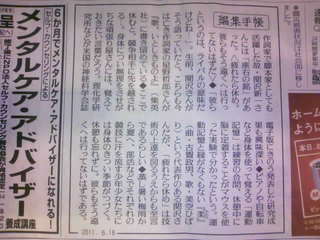昨日の読売新聞の【編集手帳】から
これは、注目すべき記事だ!

理化学研究所などが米国の神経科学会誌電子版にきのう発表した研究成果も興味深い
◆ピアノや自転車など身体を使って覚える「運動記憶」は、
練習の合間、休憩中に脳に定着することがマウスを使った実験で分かったという。
理化学研究所 ホームページ
*******************************************
もらえたら嬉しいです)
*******************************************

運動学習の記憶を長持ちさせるには適度な休憩が必要
―休憩の間に運動学習の記憶が神経回路に沿って移動し固定化する-
2011年6月15日 理化学研究所
一夜漬けの短期学習(集中学習)で試験をパスしても、その後すぐ忘れてしまうのに対し、適度な休憩(間隔)を取って繰り返し学習(分散学習)すると、その効果(記憶)が長続きすることを経験した方は多いはず。心理学ではこの現象を「分散効果」と呼び、その原因が、脳内で起こる短期記憶から長期記憶への変換プロセスにあると想定されています。このプロセスを分子レベルで解明すれば、記憶の仕組みの理解が進むと期待されますが、分散効果のメカニズムを探る実験パラダイムが確立していませんでした。
脳科学総合研究センター運動学習制御研究チームらは、マウス眼球の運動学習を定量評価することで、学習中における休憩の重要さを解明することに成功しました。
動物には動くモノを無意識に目で追うという習性があり、練習を繰り返すと運動学習が生じて、より大きく眼球を動かすようになります。
研究グループは、4・5秒で1往復するチェッカーボードを、マウスに集中的あるいは休憩を取りながら分散的に目で追わせ、生じた学習効果(運動記憶)を比較しました。
その結果、集中学習では24時間後に記憶が半分ほどに減少する(忘れる)のに対し、分散学習ではほぼ100%記憶していることが分かりました。
これらのマウスの小脳皮質を局所麻酔してプルキンエ細胞の出力を遮断したところ、集中学習の記憶は消滅しましたが、分散学習の記憶は影響を受けませんでした。
このことから、集中学習による記憶は小脳皮質にあるが、休憩をとると「記憶痕跡のシナプス間移動」が生じ、小脳皮質の記憶は小脳核へと移動することを突き止め、「学習には休憩が大事だ」ということを科学的に証明することができました。
また記憶を小脳核で固定化するには、休憩中に小脳皮質で作られる何らかのタンパク質が欠かせないことも明らかとなり、記憶障害を伴う病気の治療へ新たな知見を提供すると期待されます。
プレスリリース全文
PDF版へのリンク
*********
この記事の英語版 “A better way to remember”
*******************************************
もらえたら嬉しいです)
*******************************************
A better way to remember
Memories are more likely to stick if learning includes regular periods of rest.
Now researchers think they know why
June 15, 2011
RIKEN
Scientists and educators alike have long known that cramming is not an effective way to remember things. With their latest findings, researchers at the RIKEN Brain Science Institute in Japan, studying eye movement response in trained mice, have elucidated the neurological mechanism explaining why this is so. Published in the Journal of Neuroscience, their results suggest that protein synthesis in the cerebellum plays a key role in memory consolidation, shedding light on the fundamental neurological processes governing how we remember.
The "spacing effect", first discovered over a century ago, describes the observation that humans and animals are able to remember things more effectively if learning is distributed over a long period of time rather than performed all at once. The effect is believed to be closely connected to the process of memory consolidation, whereby short-term memories are stabilized into long-term ones, yet the underlying neural mechanism involved has long remained unclear.
To clarify this mechanism, the researchers developed a technique based around the phenomenon of horizontal optokinetic response (HOKR), a compensatory eye movement which can be used to quantify the effects of motor learning. Studying HOKR in mice, they found that the long-term effects of learning are strongly dependent on whether training is performed all at once ("massed training"), or in spaced intervals ("spaced training"): whereas gains incurred in massed training disappeared within 24 hours, those gained in spaced training were sustained longer (Fig. 1+2).
Earlier research suggested that this spacing effect is the product of the transfer of the memory trace from the flocculus, a cerebellar cortex region which connects to motor nuclei involved in eye movement, to another brain region known as the vestibular nuclei (Fig. 3). To verify this idea, the team administered local anesthetic to the flocculus and studied its effect on learning. While learning gains in mice that had undergone one hour of massed training were eliminated, those in mice that had undergone the same amount of training spaced out over a four hour period were unaffected.
Explaining this observation, the researchers found that the spacing effect was impaired when mice were infused with anisomycin and actinomycin D, antibiotics which inhibit protein synthesis. This final discovery suggests that proteins produced during training play a key role in the formation of long-term memories, providing for the first time a neurological explanation for the well-known benefits of spaced learning - as well as a great excuse to take more breaks.
*******************************************
もらえたら嬉しいです)
*******************************************
【A8 広告】
当ブログ管理人が各社に見積を取ったところ
こちらの自動車保険が一番低価格でした。
車種:HONDA インサイト
Web 見積りの【保存】を御薦めします!
東京海上グループで安心そうですし、
Web契約で【1万円引き】は業界最高!









